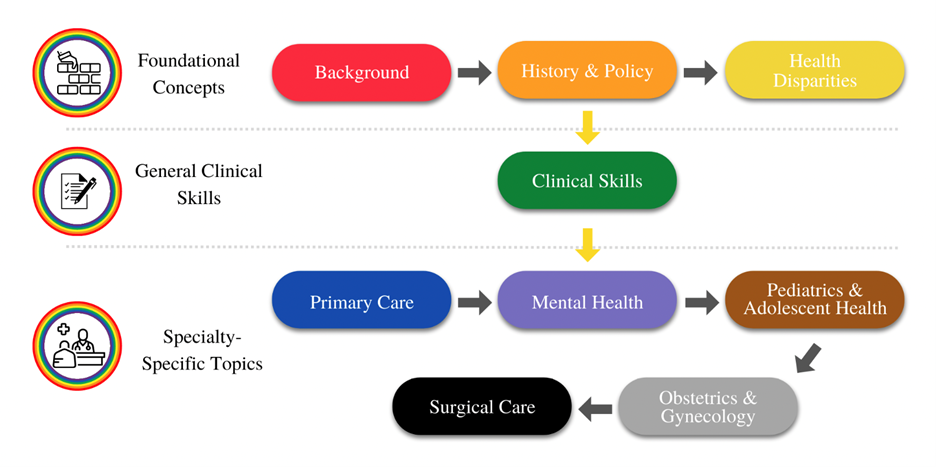As almost-graduated M4s at the University of Michigan Medical School (UMMS) we have had a lot of exposure to the full breadth of the curriculum from the foundational Scientific and Clinical Trunks during our M1 and M2 years all the way up to the broad elective time in the Branches during our M3 and M4 years. We feel so fortunate that we were both able to develop a strong foundation early on and have the time to explore our own areas of interest later in the curriculum. However, as we moved through the curriculum, one area that we hoped to have more exposure to was LGBTQIA+ health.
As is true for many medical schools across the country, coverage of topics relating to LGBTQIA+ health in medical curricula can feel sparse and disjointed. At the time that we both matriculated, UMMS had existing LGBTQIA+ health teaching during a couple of required sessions in the M1 and M3 Doctoring curriculum, as well as through the optional Transgender Health elective that can be taken in the Branches. While these sessions were certainly necessary and beneficial, we felt that a more comprehensive and cohesive course covering foundational and advanced topics relating to LGBTQIA+ patient care would be highly valuable for UMMS students.
In addition to our own personal experiences with the UMMS curriculum, we also participated in a research effort in collaboration with Dr. Dustin Nowaskie, a current faculty member at Keck School of Medicine and Founder and President of OutCare Health. Through this study, we learned that medical students may need as many as 35 hours of curricular education in order to ensure high levels of LGBTQIA+ cultural humility in patient care. Driven by this, we led the effort to create a new course titled “Introduction to LGBTQIA+ Health”.
Taking advantage of flexibility in the Branches phase of the curriculum, in addition to the resources available to us via the Capstone for Impact program, we embarked on a nearly one-year journey of developing this novel curriculum. Under the invaluable mentorship of Dr. Julie Blaszczak in the Department of Family Medicine, we brainstormed any and all topics relating to LGBTQIA+ health that a future physician would find useful in caring for a LGBTQIA+-identified patient. Through many weeks of revisions and gathering outside input, we decided that this course would fit best as a two-week, online elective and would cover a broad range of topics in nine distinct modules building from basic, foundational concepts and ending in specialty-specific care topics.

Overview of the nine modules of the course: Starting from basic foundational concepts, moving to general clinical skills, and finishing with relevant LGBTQIA+ care topics in different specialties.
In order to make the course as engaging as possible, we incorporated a variety of learning modalities including required readings, journal articles, podcasts and videos. We also reached out to content experts at our institution and across the country to record lectures, which we embedded into the course. Through OutMD, our LGBTQIA+-focused student group, we also recruited other medical students to help with construction of each of the nine course modules.
After many hours of hard work in planning, designing and building these modules, our team is so proud that this course is up and running for UMMS students to take during their M3 and M4 years in the Branches! From initial data taken from students who have completed the course, we were able to show that students have higher basic knowledge in this area and are more clinically prepared and confident in the care of LGBTQIA+ patients.
We are ecstatic about how this course has turned out, and we hope that it has a lasting positive impact on future UMMS students. More and more people in the U.S. are identifying as LGBTQIA+ and as such we as future physicians have a responsibility to provide the most competent and informed care possible to this growing subset of the population. We hope that this course bridges a gap in medical education and will overall make UMMS graduates more able and comfortable in delivering healthcare to LGBTQIA+ patients.
Don’t miss the next Dose of Reality.
Anuj Patel, MS (he/him) is a fourth-year medical student at the University of Michigan Medical School. He is passionate about LGBTQ+ health education and recently applied into otolaryngology – head and neck surgery for residency! He can be followed on Twitter @AnujUPatel.
Hannah Glick, MPH (she/her) is a fourth-year medical student at the University of Michigan Medical School. She is passionate about DEI work and serving the LGBTQ+ population. She recently matched at the University of Michigan for urology residency! She can be followed on Twitter @glick_h.
